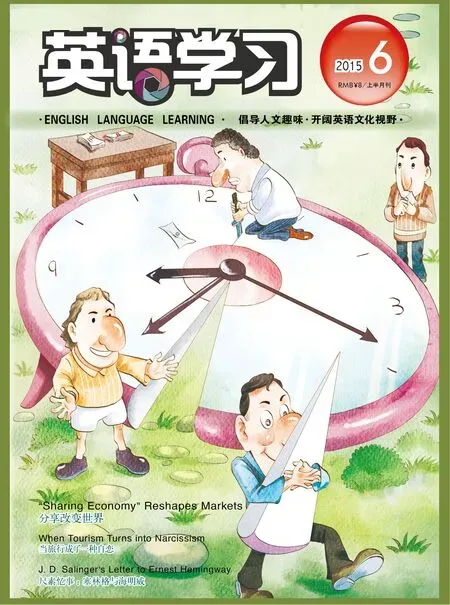微妙的“泡沫”
∷林巍 文/译
原 文
[1] 在任何商品经济社会,都有虚的成分,即都会有经济泡沫(不等于“泡沫经济”),因为那有利于筹集资本、促进竞争、活跃市场,但要限制在一定范围和程度之内,否则任其恶性一面发作,就会造成很大危害。
译 文
[1]“Bubbles”seem to be part of any commodity economy, which may not necessarily be developed into a bubble economy. A certain amount of economic bubbling is inevitable and even necessary in terms of financing projects, promoting competition and prompting the market. However, it has to be limited to a certain extent if a society doesn’t wish to see its vicious side effects.
译 注
就“泡沫”概念而言,似有如下英文词语可以考虑,如:froth, lather, foam,bubble 等。具体来讲,Beer froths when it is poured out (啤酒倒出来时会起泡沫),其中的 froth 是动词,即“产生泡沫”。该词还可沿意用作名词,如The play was nothing but froth (这出戏只不过是浅薄的表演)等。lather的意思比较具体,一般不用引申含义,如Many frugalistas swear this will allow it to harden and last longer, without affecting the lather.(许多节俭的人发誓说,这会使肥皂变硬且使用时间更长,而不会影响产生泡沫)。而最含引申意义的是foam和bubble。 foam原意为液体的泡沫:Why do certain liquids tend to foam while others do not?(为什么特定的液体可以起泡而另一些就不行呢?)后逐渐泛指,如Real estate foam once occurs, will bring serious results to the society.(房地产泡沫一旦发生,将给社会带来严重后果)
然而,与市场、经济最紧密的“泡沫”,在英文里还属bubble。由于其约定俗成的形象含义,最具引申含义,如But then we were not being singled out,the entire country lives in a bubble of unreality, cut off from the outside world and watched by an army of informers.(但当时我们没有被挑明,整个国家生活在一个虚幻的泡沫中,切断了与外界的联系,时时受到一大群告密者的监视)
原 文
[2] 简单而言 ,泡沫经济是虚拟经济偏离实体经济、虚拟资本超过现实资本的产物。所谓“现实资本”是指以生产要素或商品形式存在的实物形态的资本,而“虚拟资本”,是指以有价证券形式存在、并给持有者带来收入的资本,如股票、债券、不动产抵押单等。
[3] 虚拟资本的运作,主要体现在金融领域,而只要有金融便有金融投机。如果金融投机交易过度膨胀,超越实体资本和实业部门的增长,且愈演愈烈,便会形成社会经济的虚假繁荣,酿成泡沫经济。
译 文
[2] Generally speaking, a bubble economy occurs where market trading prices deviate from the real market fundamentals, and fictitious capital exceeds actual value. The so-called “actual capital” is the essential factors of production or commodity used as capital in an investment, while “ fictitious capital” plays its role in the form of bonds capable of bringing pro fit to the owner,such as shares, securities, real estate mortgages and so on.
[3] Fictitious capital is mainly invested in the financial sector where speculation is rife. As the volume of financially speculative trades becomes overheated,exceeding that of actual capital and industrial growth with unbounded expansion, phony social and economic prosperity may appear, resulting in a bubble economy.
译 注
在[2]中“虚拟经济”并未译成virtual economy,而是对应 real market fundamentals,译成了market trading prices,而“虚拟资本”则译为fictitious capital(该词亦为“虚伪资本”、“虚构资本”、“虚拟本钱”等),类似的还有 fictitious transaction(买空卖空), fictitious assets(虚拟资产)等,但“现实资本”并不一定永远译成actual capital, 而此处根据具体上文所指,译为actual value。
在[3]中,对“虚假繁荣”,可选择的译法有 false prosperity, illusory prosperity deceitful prosperity,borrowed prosperity, time-honored premise, the boom period, a sham 等,然而,本文中这些都没有用,而是用了phony prosperity,因phony的原意不只有not genuine or real, counterfeit,且还有fraudulent,spurious之意(The New Oxford Dictionary of English; Merriam-Webster’s Unabridged Dictionary),如The truth is, gold is the best gauge of inflation,not the government’s phony CPI numbers(事实上,黄金是衡量通货膨胀最好的工具,而不是政府虚假的CPI数字);在美国当代报刊上经常出现类似这样的标题“Phony Prosperity Comes with Heavy Price”(虚假繁荣的沉痛代价),“America’s 30 Years Of Phony Prosperity”(美国30年的虚假繁荣)等;而此处其实是“社会经济的虚假繁荣”(phony social and economic prosperity)并与 bubble economy 相吻合。

原 文
[4] 任何泡沫经济最终都是要破掉的,不过是一个时间的问题。这在经济表面繁荣时期,似乎让人难以置信。例如,日本和中国香港这样土地稀缺的地方,地产一向被认为是只升不降的,因而投资者蜂拥,房价被抬得奇高。到20世纪90年代初,日本的地产泡沫破灭了,非常之惨,至今还没有回到原来的价位上,而且拖累其经济从此低靡了二十余年。香港的地产泡沫是90年代后半叶破灭的,也令许多人损失惨重,如今也仍未完全恢复元气。在这两地的泡沫破灭过程中,本人当时恰好都亲临其境。
[5] 这是任由资本(特别是虚拟资本)的市场运作所致。市场固然有调动积极性、整合资源、优化组合的积极一面,但也有唯利是图、畸形发展的盲目性甚至是破坏性的一面。市场是一把双刃剑,而市场的功能也不是万能的。若任由市场发展,结果只能是日益严重的两极分化。所以,市场经济并非是要甩开政府。
译 文
[4] The eventual bursting of any bubble economy is not a matter of if but when, which seems quite inconceivable when everyone is in a buoyant economic mood. It would be unthinkable for real estate to depreciate, for example,in such property-driven economies as Japan and China’s Hong Kong, where a flock of investors pump prices sky high. In the early 1990s, however, the real estate bubble popped miserably in Japan and it has not yet recovered in full even now. The same thing happened in China’s Hong Kong in the late 1990s, with a lasting effect on its current economy. As a witness, I happened to be in these two places when that occurred.
[5] Capital invested in the market, especially fictitious capital, is to blame for bubbles. The market mechanism surely stimulates production, synchronizes resources and optimizes investment, but should not forget its pro fit-driven nature, which can cause various irrational damages. The market is indeed a double-edged sword; it is multifunctional but not omnipotent. Allowing market to play its role to the fullest extent will only polarize a society; a market economy is hardly to be healthy in its anarchical stage.
译 注
在[5]中,“这是任由资本(特别是虚拟资本)的市场运作所致”,这里的“资本”不是一般意义上的,而是特指 capital invested in the market;“所致”,因是指造成泡沫而言,故带有贬义,译为 ...is to blame for...。“市场固然有调动积极性……破坏性的一面”,此处的“市场”实际指的是“市场机制”或“市场功能”,故译为market mechanism;“但也有……的一面”,为加强语气,不妨增词 but should not forget its... ;“唯利是图、畸形发展的盲目性甚至是破坏性的一面”,词语颇具板块式密集,翻译时可不必一一对应,而不妨合理浓缩为 its pro fit-driven nature, which can cause various irrational damages;“市场的功能也不是万能的”,为使语句通顺、流畅,这里将“功能”同样译为形容词:It is multifunctional but not omnipotent.
原 文
[6] 我在西方国家生活的十余年间,听到最多的,是人们要求政府、组织做更多、更好的事。在我们这里,进一步改革的内容之一,是政府更多地放权,更少地介入市场,足见两种经济处在不同的发展阶段上。须知,在闹革命之前,就是市场经济,不过那时的政府不行,于是换掉了。当然,政府的作为也有着两重性,既可以加速泡沫的形成,也可以防范、疏导或减缓泡沫的危害。
[7] 永远不可忘记的硬道理是,经济的发展归根结底要靠实体而非炒卖;正如人们要喝的毕竟是啤酒,而不是泡沫。
译 注
在[6]中,“须知,在闹革命之前,就是市场经济,不过那时的政府不行,于是换掉了”,其中的“闹革命”,显然是指1949年以前的事,而历史上又一度称之为“旧社会”,故在译文中有所体现——old society,而将“闹革命”置于句末作状语以“互文”——through a revolution;“政府不行”,不好直译,而用了incompetent(无能),语气似乎轻了些,但与government相搭配,其实在英文里的含义是很重的,如:A weak and incompetent government, not only unable to promote economic and social development and even it will be dif ficult to maintain their own rule.(一个孱弱无能的政府,不仅无力推动经济、社会的发展,甚至连自身立足也难以维系)。同时,“政府的作为也有着两重性”,并未译作double sides 等,而考虑到其介入的多面性,故用了involvement...multifaceted,当然结果主要还体现在两个方面。

译 文
[6] During my years living in western countries, I got the impression that their governments and organizations were pushed all the time to do more and better. One of our indepth reforms, on the other hand, is to further delegate powers to lower levels and involve the market less. Clearly, the two kinds of economies are in different phases of their development. We should realize that there was a market economy in the “old society” under an incompetent government which was thrown out through a revolution. Government involvement, however, is also multifaceted; it can in flate the bubble further or prevent, con fine or prolong its formation.
[7] The hard truth is any economic development after all relies on substantial economy not speculation, just as what people actually enjoy drinking is beer not bubbles.

